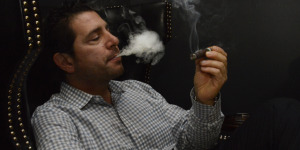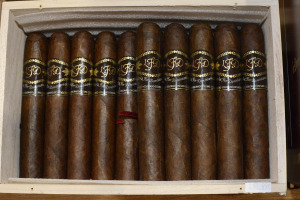Doc James rolls expertise into cigar lounge business
Two piles of leaves sat on the floor of a tobacco barn in Nicaragua waiting to be sold to cigar manufacturers.
After their purchase, the leaves would be shipped to factories where cigar makers would chop, cut, bind, press and wrap them to make the finished product ”” coronas, robustos, torpedoes and Churchills ”” that would find its way to cigar shops around the world.
Among those buying tobacco that day in 2012 were Josh DeSiena and his brother Adam, who have been in the cigar business in Westchester County since 1993.
In Shrub Oak, Adam runs the Doc James Tobacco Shop, first opened by Harold James in 1938, and 312 Cigar Club. In Mamaroneck, Josh opened Doc James Cigar Lounge in 2007 and five years later, converted a 19th century horse barn into the new lounge.
“I”™m very proud of this place,” Josh DeSiena said over the front desk of his East Prospect Avenue shop, the sweet-yet-spicy aroma of the cigars hanging in the air. “Myself, my father, my uncle, we built everything, designed everything and figured it out.”
On a Thursday afternoon, the first round of the weekly PGA Tour event was playing on two different screens ”” among the several nods to DeSiena”™s past as a PGA professional at Doral Arrowwood in Rye Brook and other area courses.
In the lounge, patrons can rent a locker named for a famous golfer, golf course or professional athlete to store cigars. Customers are welcome to relax on the comfortable leather chairs while enjoying a cigar, or they can walk through the barn door and sit outside on the patio.
“My feel was, coming from the golf business, I worked mainly at public courses,” DeSiena said of how he appointed the interior of his cigar lounge. “I”™ve always tried to provide the private club feeling at a public place, and if you”™re a golfer, you know the difference.”
And there can be a big difference. But DeSiena noted that memberships are offered but not required. And while the upstairs of Doc James Cigar Lounge is generally reserved for its 115 members, anyone is welcome to come in and enjoy a cigar.
“In here, you get a great bunch of guys,” DeSiena said of his patrons. “This is why cigars are what they are ”” there”™s a great sense of camaraderie. Smoking a cigar is an event. You plan your day or your night around it.”
DeSiena said the atmosphere that makes Doc James Cigar Lounge a draw for customers is a combination of selection, expertise and experience.
“The best thing about cigars is that you smoke according to your mood or according to the time of day,” DeSiena said. “That”™s going to determine if you have a medium cigar, a full-bodied cigar, a spicy cigar or a more earthy cigar.”
They”™re contained inside a walk-in humidor, which holds such a vast selection of cigars that DeSiena couldn”™t put a number on exactly how many there are.
“This is where we house all our goodies,” DeSiena said, waving an arm past shelves upon shelves of cigars, each handmade and individually wrapped in cellophane and displayed in wooden boxes.
“I try to carry cigars that you can”™t find at a lot of other places. I”™m very picky about what I carry,” said DeSiena, who taste-tests everything that he sells and is one of less than 200 retailers in the United States that carry Davidoff cigars, one of the world”™s premier brands. Davidoff cigars generally retail in the $15 to $60 range, although some varieties and vintages carry high premiums.
“We just got in a new La Flor Dominicana. It”™s called “Chapter Two,” which has a medium-to-full body,” DeSiena said. “Cigars have gotten much, much more complex. And that comes from the different tobaccos that cigar makers can get their hands on.”
DeSiena theorizes that a lull in the business in the past decade created a surplus of tobacco that has led to more diverse blending by cigar makers.
“Cuba has bottomed out. They never let their soil recover,” DeSiena said. The U.S. trade embargo, which was extended to cover all Cuban imports on Feb. 7, 1962, hasn”™t helped either. “They”™re not the best in the world anymore.”
The best cigar tobaccos nowadays, despite popular misconceptions, come from Honduras, Nicaragua, Ecuador and Mexico, DeSiena said, which is why Josh and Adam were at that tobacco sale in Nicaragua.
“We”™re trying to get into the distribution end” of the cigar business, DeSiena said, holding a DeSiena Corona that was made from the tobacco purchased on the brothers”™ trip to Central America. “This just got rated a 92 in Smoke magazine. It”™s all Nicaraguan, with a little touch of Colombian tobacco in it.”
And like a craft-brewed beer or small batch whiskey, the uniqueness of the flavor is what matters with a hand-rolled cigar.
“Nicaraguan tobacco has a bigger depth of flavor. There”™s more complexities,” DeSiena said. “You”™re going to get a little bit more body, but the flavor is certainly there.”
This article was first published in WAG magazine, the Business Journal”™s sister publication.

